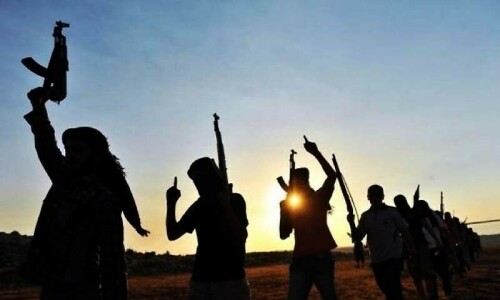AWAY from the media headlines focused on local governments, elections and the like, upper Sindh has been roiled by a series of protests this week. The trigger was a bomb blast near Jacobabad on Thursday targeting a senior Barelvi leader in the province, Syed Ghulam Hussain Shah, custodian of the Dargah Hussainabad in Qamber. Mr Shah survived but a grandson died in the attack, sending sectarian — Barelvi-Deobandi in this case — tensions soaring in upper Sindh. Bomb attacks are still rare in the region, the last major incident being a foiled suicide attack against Ibrahim Jatoi, a leader of the National People’s Party, in December 2010 on Muharram 10. There was also the appalling case last December of the man accused of blasphemy who was dragged from a police lock-up and burned alive. While still too early to identify a definite pattern of violence, bubbling under the surface are all manner of societal changes that may be turning the land of Sufis that interior Sindh has long been known as into a bastion of intolerance and extremism.
As with most such emerging threats, the genesis can be traced to the breakdown of traditional social structures. Generally viewed from the outside as static and stuck several centuries in the past, interior Sindh has in fact changed a great deal in recent years. Feudalism has been weakened, as have the tribal structures predominant in upper Sindh. Sufi Islam too has suffered as succession chains at various shrines have been disputed, often with an eye to the social prestige and domination over land that control of a shrine can bring. There has also been the emergence of a rural middle class and new urban centres — realities that have been hidden away in part because no census has been held since 1998. While change should be welcomed, the problem in Sindh is that the state has not stepped in to provide direction and structure to the new social and economic realities. Inevitably, then, the space is being filled by a growing private mosque, madressah and social welfare network with its own priorities and agenda.
Is it too early to flag the problem as a serious threat? Perhaps. But it’s in the nature of such slow-moving changes that by the time they emerge as serious threats to the social fabric and national stability, it is too late to stop them. The effects of letting sectarianism grow unchallenged and uncontested in other parts of the country are all too apparent. The core of Sindh is still moderate and non-violent. Now is the time to move to protect it.













































Dear visitor, the comments section is undergoing an overhaul and will return soon.